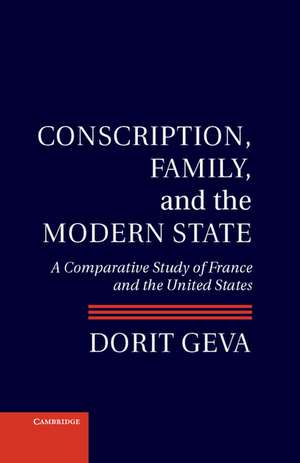Conscription, Family, and the Modern State: A Comparative Study of France and the United States
Autor Dorit Gevaen Limba Engleză Hardback – 11 aug 2013
Preț: 516.19 lei
Preț vechi: 688.76 lei
-25% Nou
Puncte Express: 774
Preț estimativ în valută:
98.82€ • 102.72$ • 81.93£
98.82€ • 102.72$ • 81.93£
Carte indisponibilă temporar
Doresc să fiu notificat când acest titlu va fi disponibil:
Se trimite...
Preluare comenzi: 021 569.72.76
Specificații
ISBN-13: 9781107024984
ISBN-10: 1107024986
Pagini: 280
Dimensiuni: 157 x 235 x 21 mm
Greutate: 0.5 kg
Ediția:New.
Editura: Cambridge University Press
Colecția Cambridge University Press
Locul publicării:New York, United States
ISBN-10: 1107024986
Pagini: 280
Dimensiuni: 157 x 235 x 21 mm
Greutate: 0.5 kg
Ediția:New.
Editura: Cambridge University Press
Colecția Cambridge University Press
Locul publicării:New York, United States
Cuprins
Part I. Conscription, Familial Authority, and State Modernity in Modern France: 1. Nationalized coercion, familial authority, and the père de famille in nineteenth-century France; 2. Conscription, pronatalism, and decline of familial sovereignty in the early Third Republic; 3. The famille nombreuse versus the security state in interwar France; Part II. The Draft, Familial Authority, and State Modernity in the United States: 4. Breadwinning, selective service, and the First World War draft; 5. The father draft crisis and the Second World War; 6. Conclusion: familial authority and state modernity past and present.
Recenzii
'Military conscription is a charged issue that dramatically brings to the fore the complex understandings of rights and responsibilities that make up modern citizenship. In this important study Dorit Geva compares conscription - and claims for exemption from it - in two paradigmatic modern nations, France and the United States. Sharing revolutionary traditions, the two countries arrived at different systems of conscription, but through two world wars struggled over similar core ideas about what it means to be a citizen, to be male, and to have family as well as national obligations. The study casts light not only on the gendered role of military service in citizenship but on core ideas about fairness, obligation, and sacrifice.' Craig Calhoun, Director, London School of Economics and Political Science
'Soldiering and fathering - the 'two sides of masculine citizenship' in the modern state - are at odds. If men soldier, they aren't around to support - and rule - their families. If they father, they are less available to fight. How modernizing states in France and the United States negotiated these tensions is the subject of this fascinating book, which analyzes the rise and decline of family-based exemptions to military conscription as well as women's rights in family law. By showing how citizenship is gendered for men as well as women, Geva breathes fresh air into the study of gender and the state.' Mala Htun, University of New Mexico
'Dorit Geva's penetrating new study, Conscription, Family and the Modern State: A Comparative Study of France and the United States, makes clear the enduring significance of military conscription for understanding social and political life today. A work of painstaking historical sociology, Geva's book effectively relates the convoluted regulatory policy of conscription in France and the United States, persuasively arguing that seemingly arcane conscription rules carry profound and long lasting social and political significance. In her book, historical sociologists, political scientists, and scholars of gender and family alike will find much of value for their own fields of research and indeed may find fertile new ways to connect across fields.' Thomas Crosbie, American Journal of Sociology
'Soldiering and fathering - the 'two sides of masculine citizenship' in the modern state - are at odds. If men soldier, they aren't around to support - and rule - their families. If they father, they are less available to fight. How modernizing states in France and the United States negotiated these tensions is the subject of this fascinating book, which analyzes the rise and decline of family-based exemptions to military conscription as well as women's rights in family law. By showing how citizenship is gendered for men as well as women, Geva breathes fresh air into the study of gender and the state.' Mala Htun, University of New Mexico
'Dorit Geva's penetrating new study, Conscription, Family and the Modern State: A Comparative Study of France and the United States, makes clear the enduring significance of military conscription for understanding social and political life today. A work of painstaking historical sociology, Geva's book effectively relates the convoluted regulatory policy of conscription in France and the United States, persuasively arguing that seemingly arcane conscription rules carry profound and long lasting social and political significance. In her book, historical sociologists, political scientists, and scholars of gender and family alike will find much of value for their own fields of research and indeed may find fertile new ways to connect across fields.' Thomas Crosbie, American Journal of Sociology
Notă biografică
Descriere
This book compares how the American draft system and the French conscription system came to be.
